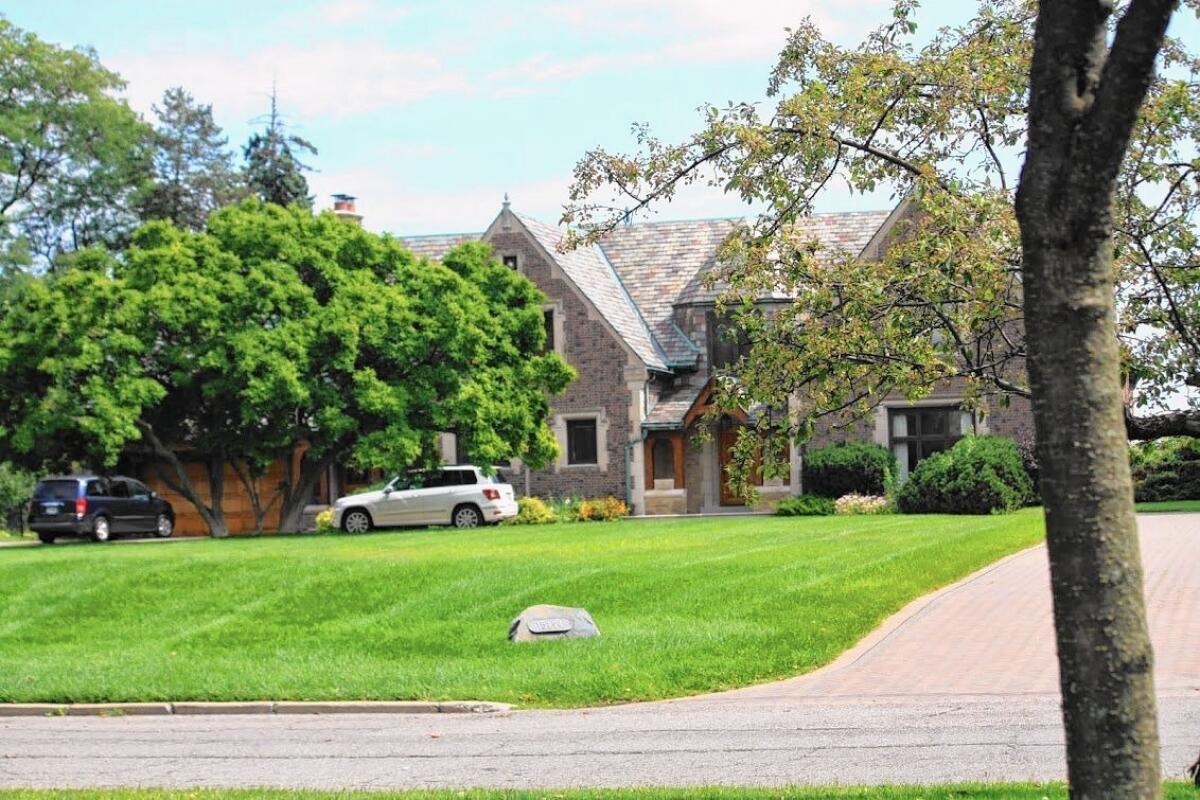At Detroit’s border, a barrier separates the haves from have-nots

- Share via
reporting from GROSSE POINTE PARK, Mich. — The border between Grosse Pointe Park and Detroit represents a huge dividing line separating the haves and have-nots:
Detroit’s median household income is $26,955. Grosse Pointe Park’s is $101,094.
The average response time for Grosse Pointe Park police was 3.4 minutes in 2012. In Detroit’s Precinct 4, which borders Grosse Pointe Park, the average response time that year was 30 minutes.
A drive down Alter Road sums up the challenges facing the well-to-do suburb and the former industrial powerhouse.
On one side of the road — the Detroit side — there’s block after block of dilapidated houses and vacant lots overflowing with weeds. On the Grosse Pointe Park side, a main street leads to yoga studios, beer gardens, antiques stores and even feel-good music being piped from the quaint lampposts.
Tensions between the communities are palpable as one tries to remain one of the most desirable suburbs in the region, despite its border with a long-troubled city that declared the largest municipal bankruptcy in U.S. history.
Earlier this year, Grosse Pointe Park erected a barrier on Kercheval Road, one of the few streets that allow car access between Grosse Point Park’s leafy streets and the blighted ones of Detroit. Grosse Pointe Park officials say the barrier, which resembles a barn, was erected for a farmers market.
Last winter, Grosse Pointe Park was accused of plowing snow to create a barrier that blocked the street to Detroiters.
“There’s so much tension between the suburbs and the city in Wayne County. I think they’re very determined to try and insulate themselves from the cost of the bankruptcy,” said Kevin Boyle, a Detroit native who teaches history at Northwestern University. “The suburbs are terrified by the thought that they’d be caught up in Detroit’s problems.”
The disparities between city and suburb were created consciously after Detroit started becoming more diverse. In much of the 20th century in Grosse Pointe Park and other suburbs, real estate agents sized up desirable clients by awarding potential home buyers points based on race and religion. Civic associations prohibited selling homes to nonwhites, writes Ross Eisenbrey, a vice president at the Economic Policy Institute who grew up in Grosse Pointe.
Racial tensions linger today. At the Pointes, as the five Grosse Pointe municipalities are called, residents must show an ID to enter public parks. As Detroit’s fortunes flagged, black residents abandoned the city for the suburbs, often as renters. Equipped with new IDs, they began showing up at parks, prompting grumbling that out-of-towners were using the parks or inviting too many guests.
Grosse Pointe Park, with about 11,000 residents, is 85% white. Detroit, population 688,000, is 82% black.
In the last year or two, there have been complaints at the suburb’s premier park, which resembles a country club, with yachts listing quietly in the lake, bubbling fountains and an Olympic-sized swimming pool.
“I do sense it from some of the residents. If there’s an African American picnic there, and people are hopping in the pool, I sense a bit of, ‘What are you doing in my park?’” said Paul Wargo, who mans the gates at the park.
But Grosse Pointers seem to be realizing that the cities’ futures might be linked. After all, Detroit’s financial woes were caused in part by the decline of the auto industry, which also affected the suburbs where executives once lived.
The median sales price of homes in Grosse Pointe Park dropped 71% from a peak of $385,000 in 2007 to $111,000 in 2012.
Wayne County, which encompasses Detroit, Grosse Pointe Park and other suburbs, has been struggling financially since the housing crisis.
The county sheriff’s department has already cut its investigation and street enforcement programs and temporarily dropped narcotics enforcement. Grosse Pointe Park and other police departments have also lost staff as cities trim budgets.
Moreover, some Detroit suburbs have seen an increase in crime. In Harper Woods, which borders both Detroit and the Pointes, a recent shooting at a shopping mall has kept visitors away.
“My husband will kill me if he knows I’m here,” said Susan Mulrenin, who lives in the wealthy suburb of St. Clair Shores, while standing in the parking lot of the Harper Woods mall after a quick trip to Target.
Few incidents highlight the tensions between the suburbs and the city more than the shooting of Renisha McBride, a Detroit resident who knocked on the Dearborn Heights home of a man in the middle of the night. Theodore Wafer fired shots out his front door, killing her. Wafer, who said he had feared for his life, was sentenced in September to 17 years in prison.
But amid the tensions, there have also been some positive developments as Detroit winds its way out of bankruptcy.
“This is a time of heightened awareness of the problems that many people have ignored,” said Ron Omilian, a Grosse Pointe Park resident.
For one thing, many of Detroit’s problems were caused when wealthy residents moved farther out of the city, taking their tax dollars with them. But now, some are thinking about heading back.
Grosse Pointers used to avoid going into the city for anything but sporting events. Now, Grosse Pointers are joining bike tours into Detroit and heading into the city — and even buying real estate that’s plentiful and cheap, said Randy Repicky, a Realtor in Grosse Pointe Farms.
“We’re seeing people buying second homes in a loft or something that they can use for weekend homes in the city,” he said.
Kathy Shannon, a Grosse Pointe resident, owns a company that repairs city trucks. Now that Detroit is trying to turn itself around, business is getting better, she said.
“The bankruptcy has been a very positive thing,” she said.
Christine Stesney-Ridenour, chief operation officer of Beaumont Hospital in Grosse Pointe, says that a feeling has come over the area that she’s never seen before in a lifetime of working in Detroit.
“This is the first time that I can remember that people are actually seeing some change,” she said. “It can only help Grosse Pointe when the city is doing better.”
Even the barrier on Kercheval Road might eventually come down. Newly elected Detroit Mayor Mike Duggan signed a deal with Grosse Pointe Park: Detroit will tear down some blighted buildings at the border in exchange for the barrier’s removal.
More to Read
Sign up for Essential California
The most important California stories and recommendations in your inbox every morning.
You may occasionally receive promotional content from the Los Angeles Times.











